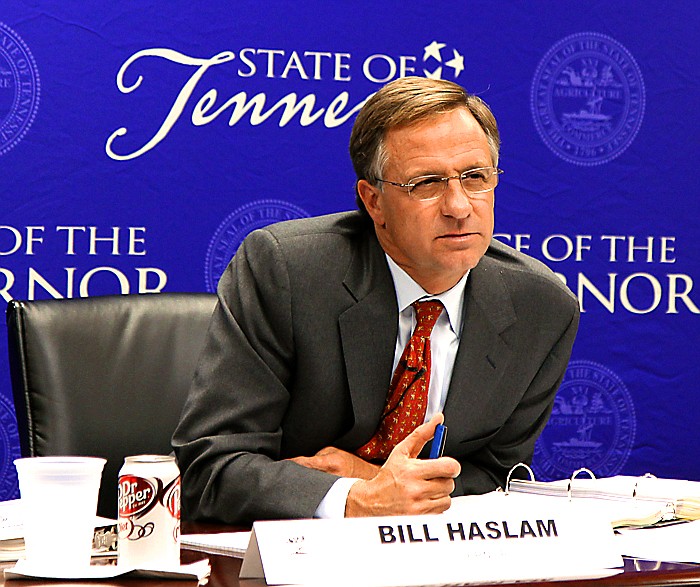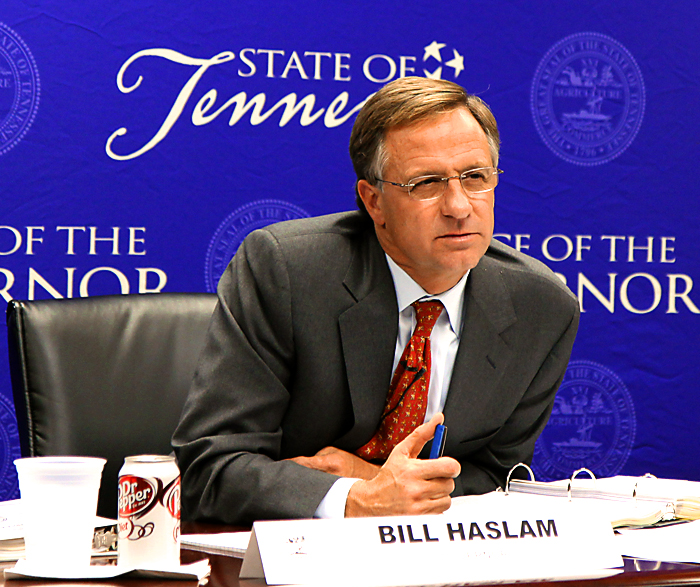NASHVILLE - Gov. Bill Haslam warned Monday of "hard" choices ahead in Tennessee's upcoming 2011-12 budget as the state's new chief executive held his first hearings on state spending.
"I think what you're seeing is a lot of those things that were cut last year on paper but haven't been implemented yet," Haslam told reporters. "There's some painful things there."
Cuts have been masked until now with some $1.5 billion in one-time federal stimulus funds. But the money largely disappears beginning July 1, Haslam noted. While revenues have been coming back, Haslam said they cannot offset much of the previously made cuts, so the state must "prioritize."
In the meantime, Haslam is trying to create elbow room in the budget for his priorities such as fully funding inflationary and student enrollment growth in the state's Basic Education Program formula for K-12 education. That comes to about $68 million.
"We made a commitment to fully fund the BEP, and I've said all along that would be one of our priorities," Haslam said. "We're committed to doing that."
Departments across state government have been asked to provide for additional cuts of 1 percent to 3 percent. Those come on top of major cuts in previous years, including those that were offset by federal stimulus funds.
Among those making budget presentations Monday was interim Health Commissioner Susan Cooper, a holdover from the Bredesen administration.
In her plans for additional cuts, Cooper outlined additional reductions of up to $3.59 million that include shuttering two health clinics providing services for the poor.
But she sought to make the case to Haslam and Finance Commissioner Mark Emkes to continue some of the $32.9 million in programs cut last year but continued through July 1 with federal funds.
Among programs Cooper urged the governor to support was a $7 million diabetes initiative. It has helped pull the state's diabetes rate down from 11.9 percent to 10 percent, she said.
Emkes, a former Bridgestone CEO, agreed with Cooper that such programs can offset future health care costs. He said he wished officials could "double your budget" on such initiatives.
Observed Haslam, a former Knoxville mayor who touted his budgetary experience during his campaign: "Let me know what you're going to cut in half" to achieve that wish.
Cooper suggested some aspects of the diabetes program could be cut. She also suggested the state cut funding for a $30,600 shaken baby syndrome program and $860,100 now spent on a minority health initiative, among other programs.
Interim Education Commissioner Patrick Smith noted the proposed K-12 budget includes restoring about $57 million in programs extended through federal stimulus funds and another $12.2 million in programs saved through state budget reserve funds. The federal programs he advocated saving included $15 million in extended contracts for Career Ladder teachers.
He recommended $500,000 in public television system grants be restored.
"We've identified many of those same things that were funded with one-time money this year as being worthy of consideration to continue funding with one-time money in the ensuing fiscal year," Smith said.
The administration also heard from higher education officials.
At this point, the Haslam administration is missing an important piece in the budget puzzle - budget projections for the 2011-12 budget year that begins July 1.
In the meantime, the state is dealing with a bigger total budget than the $29.9 billion 2010-11 spending plan that Bredesen administration officials last spring estimated was passed by state lawmakers.
The final budget, which includes federal spending, actually totals about $31.3 billion, more than $1 billion higher than previously estimated, state Finance and Administration Department officials recently said.
Reasons for the increase included higher education tuition increases and Congress' eventual extension of more generous Medicaid match rates, which benefit TennCare.

